Hollande attends IBK investiture as Mali faces post-war challenges
French President François Hollande arrived in Bamako on Thursday to attend ceremonies to mark the investiture of Mali's new president, Ibrahim Boubacar Keita, popularly known as IBK. As his push for military action against Syria remains stalled, Hollande was assured a hero's welcome in the Malian capital, thanks to France's intervention against Islamists and separatists in the north.
Issued on: Modified:

Twenty-six heads of state were due to attend the ceremony in Bamako's stadium but Hollande has the place of honour, with a 10-minute slot reserved for him to deliver a speech before Keita himself addressed the crowd.

French troops, who led the offensive against Islamist militias and Tuareg separatists in the north last February, joined Malian and UN forces in a military parade.
Officials at the Elysée Palace told reporters that France felt it had "done its duty" in Mali and, as the Hollande government struggles to garner support for punitive action against Syria's Bashar al-Assad, they cited Mali as evidence that "France lives up to its responsibilities in the world".
Although the offensive in the north and August's presidential election are widely judged to have been successes, Mali still faces major challenges, among them:
- Security: Despite a peace agreement with Tuareg separatist groups, the vast desert region of the north is difficult to control, with Tuareg fighters clashing with Malian soldiers on 12 September and French soldiers recently intercepting a vehicle carrying a tonne of explosives. A European mission is charged with training several thousand Malian troops, a task that may take longer than initially planned, while the UN force, Minusma, has only 5,000 of its proposed 12,000 troops so far. The French force of 3,200 was supposed to be reduced to 1,000 by the end of the year but that target could be modified.
- Reconciliation: The peace deal committed Keita, who is far from being sift on the Tuareg question, to start negotiations with rebel groups within 60 days of his investiture and he has promised "national assizes of the north" top put an end to separatist uprisings that have plagued the country since independence. On 15 September a convoy carrying three ministers was stoned during a visit to Kidal.
- Democracy: Despite some accusations of malpractice, the presidential election result, giving IBK 78 per cent of the vote, was generally accepted. Parliamentary elections must be held soon, despite the fact that some 500,000 Malians are displaced, many abroad, and were unable to vote in the presidential poll.
- Economy: Corruption is rife, agriculture has been disrupted by war and the country is among the poorest in the world. Aid worth 3.2 billion euros has been promised over the next two years but so far only 150 million euros have been delivered. France has promised 280 million euros and on Wednesday the government put details of aid projects online, declaring that the move was in the interests of transparency.
Daily newsletterReceive essential international news every morning
Subscribe